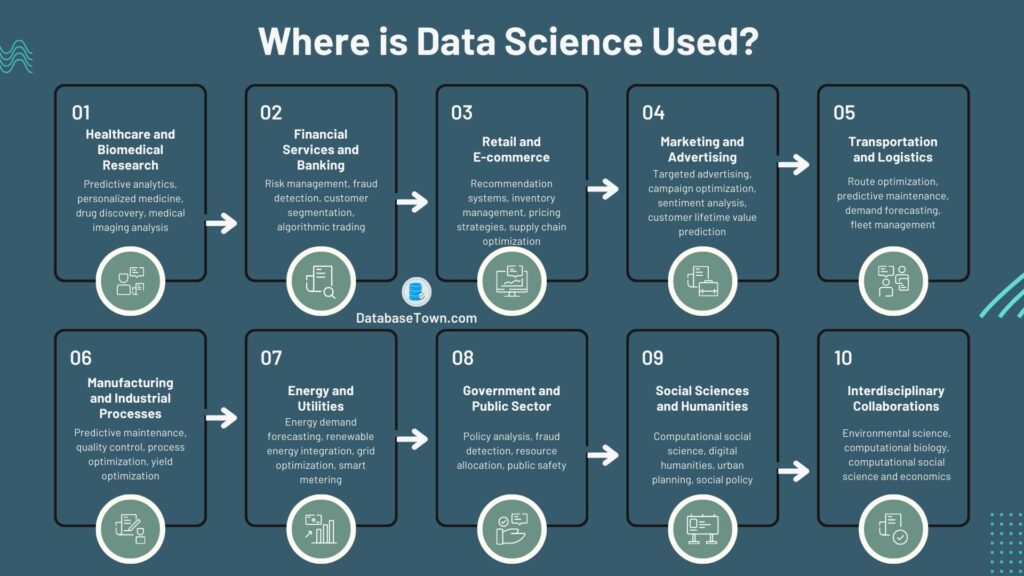
Where is Data Science Used?
Data science is revolutionizing the industries and businesses due to its ability to extract insights from huge amounts of data. It is heavily used in healthcare, finance, retail, manufacturing and many other industries. Data science techniques are employed to optimize processes, improve decision-making, and drive innovation.
Where is Data Science Used?
Data science has become an integral part of various industries and sectors as it has complete changed the decision making for the organizations. Data generation is growing exponentially, therefore, the demand for data science professionals, to extract valuable insights from this wealth of information, has skyrocketed.
Here’s a table showing summary of various areas where data science is used. Real-life examples will provide you more concrete understanding of the practical applications and implementations of data science techniques.
| Domain | Applications of Data Science | Real-Life Examples |
|---|---|---|
| Healthcare and Biomedical Research | Predictive analytics, personalized medicine, drug discovery, medical imaging analysis | IBM Watson for Oncology, 23andMe genetic testing, Recursion Pharmaceuticals drug discovery platform, Google DeepMind AI for breast cancer detection |
| Financial Services and Banking | Risk management, fraud detection, customer segmentation, algorithmic trading | JPMorgan Chase’s fraud detection system, Ant Financial’s credit scoring system, BlackRock’s Aladdin investment management platform, Renaissance Technologies’ quantitative trading strategies |
| Retail and E-commerce | Recommendation systems, inventory management, pricing strategies, supply chain optimization | Amazon’s personalized recommendations, Walmart’s demand forecasting system, Stitch Fix’s data-driven styling algorithm, Alibaba’s supply chain optimization |
| Marketing and Advertising | Targeted advertising, campaign optimization, sentiment analysis, customer lifetime value prediction | Facebook’s ad targeting, Google’s AdWords optimization, Hootsuite’s social media monitoring, Salesforce’s Einstein Analytics for marketing |
| Transportation and Logistics | Route optimization, predictive maintenance, demand forecasting, fleet management | UPS’s ORION route optimization software, Uber’s dynamic pricing and demand prediction, Michelin’s tire performance analytics, BNSF Railway’s predictive maintenance |
| Manufacturing and Industrial Processes | Predictive maintenance, quality control, process optimization, yield optimization | General Electric’s Predix platform for industrial IoT analytics, Siemens’ quality control systems, Intel’s yield optimization processes, Bosch’s connected factory solutions |
| Energy and Utilities | Energy demand forecasting, renewable energy integration, grid optimization, smart metering | Duke Energy’s wind power forecasting system, Nest’s smart thermostat energy optimization, Opower’s energy efficiency analytics, SolarCity’s grid integration solutions |
| Government and Public Sector | Policy analysis, fraud detection, resource allocation, public safety | New York City’s data-driven crime prevention strategies, IRS’s fraud detection systems, U.S. Census Bureau’s population projections, FEMA’s disaster response optimization |
| Social Sciences and Humanities | Computational social science, digital humanities, urban planning, social policy | MIT’s Billion Prices Project, Google’s Ngram Viewer for cultural analytics, Remix’s urban planning platform, World Bank’s data-driven policy analysis |
| Interdisciplinary Collaborations | Environmental science, computational biology, computational social science and economics | NASA’s Earth observation data analysis, DeepMind’s AlphaFold protein structure prediction, Santa Fe Institute’s complexity science research, D.E. Shaw Research’s computational biochemistry simulations |

Let’s elaborate the applications of data science briefly!
1- Healthcare and Biomedical Research
The healthcare industry has embraced data science with open arms. Here, data science plays a crucial role in improvement of patient outcomes, advancement of medical research, and to optimize the healthcare systems. Some common applications are:
- Predictive Analytics: Data science techniques are used to analyze patient data, medical records, and various health indicators to predict the risk of diseases and identify potential complications.
- Personalized Medicine: Genetic data is analyzed to extract lifestyle factors and medical histories. Data scientists can develop personalized treatment plans tailored to individual patients.
- Drug Discovery: Machine learning algorithms and computational models are used to analyze vast amounts of data from clinical trials, genomic studies, and molecular simulations. It facilitates the discovery of new drugs and optimization of existing ones.
- Medical Imaging Analysis: Advanced algorithms can process and analyze medical images, such as X-rays, MRIs, and CT scans to assist in diagnosis, detect anomalies, and improve treatment planning.
2- Financial Services and Banking
The financial sector has long recognized the value of data science to gain a competitive edge. Some key applications are give here.
- Risk Management: Data science techniques are utilized to assess and manage various risks, such as credit risk, market risk, and operational risk and enable financial institutions to make informed decisions and reduce potential losses.
- Fraud Detection: Machine learning algorithms can analyze vast amounts of transactional data, identify the anomalies that may indicate fraudulent activities which can help to protect customers and institutions.
- Customer Segmentation and Targeted Marketing: Customer data is analyzed including demographics, transaction histories, and online behavior. Data scientists can create accurate customer segments and develop targeted marketing campaigns that helps to improve customer acquisition and retention.
- Algorithmic Trading: Data science plays a pivotal role in development of advanced trading algorithms. These systems can analyze market data and can execute trades at optimal times to maximize the returns and minimizing risks.
3- Retail and E-commerce
Data science is a game-changer in highly competitive retail and e-commerce sectors. It helps businesses to understand customer behavior, optimize operations, and stay ahead of the curve. Some applications are:
- Recommendation Systems: Data science is used to analyze customer preferences, purchase histories, and browsing patterns. Data science algorithms can provide personalized product recommendations to enhance the customer experience and increase in sales.
- Inventory Management: Predictive analytics and demand forecasting techniques are used to optimize inventory levels. It reduces overstocking and stock-outs, and minimize costs associated with excess inventory.
- Pricing Strategies: Data scientists can analyze market trends, competitor data, and customer behavior to develop dynamic pricing strategies that maximize revenue and profitability.
- Supply Chain Optimization: Machine learning algorithms can optimize supply chain processes, from procurement and logistics to distribution. This optimization can reduce costs and improve efficiency of the organizations.
4- Marketing and Advertising
Marketing and advertising campaigns are designed, targeted, and measured on the basis of analysis of data. See these applications.
- Targeted Advertising: Customer data is analyzed to check online behavior and demographic information of the customers. Data scientists can create highly targeted advertising campaigns to ensure that the right messages reach the right audiences.
- Campaign Optimization: Machine learning algorithms can analyze real-time campaign performance data which enable marketers to optimize ad placements, budgets, and creative elements for maximum impact and return on investment.
- Sentiment Analysis: Natural language processing techniques can analyze social media conversations, reviews, and customer feedback and provide insights into consumer sentiment and brand perception.
- Customer Lifetime Value (CLV) Prediction: Predictive models can estimate the lifetime value of customers which helps businesses to prioritize their marketing efforts and target high-value segments.
5- Transportation and Logistics
The transportation and logistics industries rely heavily on data science to streamline operations, optimize routes, and improve efficiency.
- Route Optimization: Machine learning algorithms can analyze real-time traffic data, weather conditions, and logistical constraints to determine the most efficient routes for deliveries. This data helps to reduce fuel consumption and transportation costs.
- Predictive Maintenance: Sensor data from vehicles and equipment can be analyzed using predictive models to identify potential issues and schedule maintenance proactively.
- Demand Forecasting: Historical data, economic indicators, and consumer behavior is analyzed with the help of data science techniques to forecast demand for transportation services.
- Fleet Management: Telematics data when combined with machine learning algorithms, can optimize fleet operations, monitor driver behavior, and improve fuel efficiency and reduce operational costs and improve safety.
6- Manufacturing and Industrial Processes
Data science plays a pivotal role in optimizing manufacturing processes, improve product quality, and reduce costs.
- Predictive Maintenance: Data scientists analyze the sensor data from industrial equipment and machinery. This data is used to develop predictive models. Organizations use these models to identify potential failures and schedule maintenance before costly breakdowns occur.
- Quality Control: Machine learning algorithms can analyze product data, detect its defects, and identify root causes.
- Process Optimization: Data science techniques can analyze production data, identify bottlenecks, and optimize processes to increase efficiency and reduce costs.
- Yield Optimization: Predictive models analyze various factors, such as raw material quality, environmental conditions, and process parameters, to optimize yield and minimize waste in manufacturing processes.
7- Energy and Utilities
The energy and utilities sectors have taken up data science to improve efficiency, reduce costs, and promote sustainability.
- Energy Demand Forecasting: Machine learning algorithms analyze energy consumption data, weather patterns, and economic indicators to accurately forecast energy demand. Due to this organizations make better resource planning and grid management.
- Renewable Energy Integration: Data science techniques can optimize the integration of renewable energy sources, such as solar and wind, into the grid by analyzing weather patterns, demand fluctuations, and storage capabilities.
- Grid Optimization: Predictive models can analyze grid data, identify potential issues, and optimize grid operations which helps in reduced downtime and improved reliability.
- Smart Metering and Energy Efficiency: Advanced analytics can process smart meter data which provide insights into energy consumption patterns and enable targeted energy-efficiency programs for residential and commercial customers.
8- Government and Public Sector
Data science has the potential to transform the way governments operate. It is used to improve service delivery and address the societal challenges.
- Policy Analysis and Evaluation: Machine learning algorithms analyze large datasets, including census data, economic indicators, and survey responses, to evaluate the impact of policies and programs.
- Fraud Detection and Cybersecurity: Advanced analytics techniques can identify patterns and anomalies in vast amounts of data. It helps to detect and prevent fraud, cyber threats, and other malicious activities.
- Resource Allocation and Optimization: Predictive models analyze the data related to infrastructure, services, and resource utilization. It enables governments to optimize resource allocation and improve service delivery.
- Public Safety and Crime Prevention: Data science techniques can analyze crime data, demographic information, and other relevant factors to identify high-risk areas and develop targeted prevention strategies.
9- Social Sciences and Humanities
Although data science is often associated with technical domains, but it has also found applications in the social sciences and humanities and provide new avenues of research.
- Computational Social Science: Data science techniques can analyze large datasets related to human behavior, social interactions, and cultural phenomena and enable researchers to test theories, and gain deeper insights into various social dynamics.
- Digital Humanities: NLP and text mining techniques analyze the vast corpora of literature, historical documents, and other textual data which helps researchers to explore cultural narratives and find new perspectives on human creativity and expression.
- Urban Planning and Social Policy: Data related to urban environments, demographics, and socioeconomic factors is analyzed to provide insights to urban planners and policymakers to develop more inclusive and effective policies and initiatives.
10- Interdisciplinary Collaborations
Data science is not confined to specific domains; its true power lies in its ability to facilitate interdisciplinary collaborations. By combining expertise from various fields, data scientists can tackle complex challenges that transcend traditional boundaries. For example:
- Environmental Science and Climate Change: Data science techniques are used to analyze environmental data, satellite imagery, and climate models which helps researchers to better understand and address the impacts of climate change.
- Computational Biology and Genomics: Genomic data, protein structures, and biological pathways are analyzed using various techniques to accelerate the drug discovery, personalized medicine, and our understanding of biological systems.
- Computational Social Science and Economics: Data science techniques are combined with economic theories and social science principles. Researchers can gain deep understanding into market dynamics, consumer behavior, and the interplay between economic and social factors.






